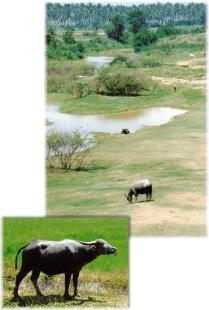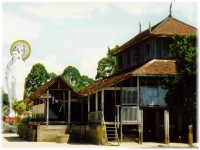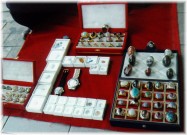As we left the town of Kota Bharu, we crossed the river known
as Sungai Kelantan. The view was filled with contrasts. There were water buffalo
walking on the shoreline or wallowing in the muddy ponds near the river
just as they have for centuries while a couple of affluent Malaysians riding
their jet skis in the center of the river. We rode on through the heat
asking while we went if we were going in the right direction.
Kelantan. The view was filled with contrasts. There were water buffalo
walking on the shoreline or wallowing in the muddy ponds near the river
just as they have for centuries while a couple of affluent Malaysians riding
their jet skis in the center of the river. We rode on through the heat
asking while we went if we were going in the right direction.
We rested in the shade of a simple multi-goods store in a small town called
Chabang Empat where we were fortunate enough to find a small store along the way to the
temple we were searching for. There we fed our bodies coolant in the form
of syrupy Coca Cola and bottled water while we sat in the shade offered
by the roof overhanging the store's front step.
If you've ever imagined the heat generated by the sun coming closer
to earth, as the writer of a Twilight Zone episode once did, you may come
close to understanding what the heat can be like in Southeast Asia. It
can be oppressive. Try as you may, hide in the shade, avoid moving, the
hot, damp air smothers you like an unfriendly fat boy in a grade school
playground. You can either stay in a room, laying completely still beneath
a fan, limit your activity to air conditioned space, or try and go about
your business layered in suntan lotion (if you are as fair-skinned as myself)
and a pool of sweat. For those who choose the latter option, there can
be relief. I found two forms:

Just as someone has suffered thirst in a desert, the often oppressively
moist-hot air of Malaysia cries out for the soothing, comforting, refreshing
waters of a mandi. There is a common, but mistaken, belief that
progress is verifiable. The mandi is a perfect example that runs
contrary to this belief. It is probably the most simplistic tool known
to man and the uninitiated would surely argue in favor of a western-styled
shower if given the choice. Let me assure you that there is no modern convenience
that comes close to providing the comfort offered by bathing with a mandi
after wading in the oppressive heat of Southeast Asia for a few hours.
A mandi consists simply of a cubed basin, perhaps three feet high
and two and a half feet square. You fill this up with water and use a
ladling cup to douse water over yourself. The water is directed more easily
to any part of your body and you get more water per space than a common
shower permits. I could never completely articulate the pleasure this most
basic form of bathing offered during the three-, sometimes four-times-a-day
I had to bathe to cleanse myself of the perspiration which
had all but consumed me.

My description of Peninsular Malaysia would never be complete without
a comment about root beer floats. With the exception of a mandi,
there was nothing that provided so much relieve from the heat as a root
beer float from a particular American restaurant chain found in nearly
all the Malaysian cities I visited. It was as if a change had taken place
in my dietary behavior, much as if I were a pregnant woman, because root
beer floats had never before or since been so important to me.
I was dreaming about one of these root beer floats and a mandi while
seated in the shade of that store at the crossroads town of Chabang Empat.
Karen "ran" across the street to buy some fruit (santol in Pilipino)
she saw being picked from a tree and hadn't tasted in a long time.
Meanwhile, I sat with camera in hand staring at an old Malay woman who
stared back with equal interest if only in a more relaxed way, having the
wisdom to moderate all her actions in accord with the climate of the environment.
She was beautiful. Not as a young woman with smooth, blemish-free, taught
skin and firm breasts pushing against her clothes. Nor in the manner of
a mother, exuding confidence in her maternity. She bore the presence of
character that calls for respect. Her clothing was bright and colorful,
but not so much so that it gave her the appearance of competing with the
generation of her daughters or granddaughters. She looked composed, confident,
fearless, and yet relaxed. She was sitting with a small cheroot in a hand
that had a brass ring which held a striking red, smooth cut, stone in it.
The traditional cloth that was draped on her head lay there looking haphazard
yet was as firmly fixed as any tudung with its visible pins here
and there. I cried out in my mind to talk to her, to learn about the experiences
which combined to create this woman a few feet away from me. Such is the
missed opportunities of vicarious travel.

We traveled on through the countryside passing a few boys who journeyed
out from the safety of a shaded stall for harvested crops to play with
their kite. Later we explored an old Buddhist temple grounds and school
where young school children were reciting phrases in Thai. Everything seemed
so desolate, as if everyone was hiding from the heat. My experiences began
to take on the surreal. I wiped the sweat that covered my exposed face
and arms. Re-applied suntan lotion to these same areas and rode a few feet
before going about this necessary ritual again. At one point, I noticed
that small white blisters had popped up on my the back sides of my hands.
We eventually reached the wat complex, and to add to our discomfort,
were disappointed by the lack of imagination used in its design. We did
delight, however, in resting in the shade to study the activity of a couple
of monkeys and "their" puppies.

One monkey was chained as some are in Southeast Asian countries where
they are trained to get coconut from the trees. There was another monkey,
a different looking monkey, but I couldn't tell you the names that are
attached to the different varieties. The chained monkey was a male, the
free monkey was a female. The female would groom the male, and the male
would become erect and then attempt to mount the female to procreate. I
guess it was too hot though, because it was just a false start. There were
also several puppies lounging in the shade afforded the wide branches of
the tree. Both of the monkeys began grooming the puppies. They spread the
hairs apart on the back of the legs, the back and the belly of these puppies.
Chasing fleas...
"There, got it." Picking up the flee between its thumb and
index finger, the monkey puts it into its mouth to crush it between his
teeth before he swallows it. A small group of teenage boys visiting the
wat decide they want to pet one of the puppies laying under the
tree next to the two monkeys. The female monkey attacks one of the boys
as he touches a puppy, as if the dog were her own child. The boy is scared
and embarrassed by the incident, but otherwise unhurt. He was fortunate
that, unlike myself, he was wearing long pants which protected him from
the monkey's bites. One puppy decided he wants to go for a walk somewhere
away from the tree. The male monkey stops him by holding onto the puppy's
tale with his feet. It was too hot for the puppy to fight much and he relented
after a short struggle.
| Fortunately our journey back to Kota Bharu was blessed by
rain as if we had been rewarded for our journey to a holy place. |
 |
 |

Popular rings with semi-precious
stones for sale on a sidewalk |
Johor Bahru is a thoroughfare for those making the transit between Singapore and Malaysia's more interesting destinations.
It's fame is derived from its proximity to Singapore. Because Johor Bahru is just a short drive across the causeway connecting the two cities separated by the Straits of Johor,
Singaporeans visit Johor Bahru to rest on the weekend and take respite from the environment of strict rules that Singapore's founding father, Lee Kwan Yew, set down during his
reign. An ethnic Chinese who had to learn Chinese as an adult, Lee showed his Chinese cultural rennaisance by choosing a strict Confucian style of governance. Malaysia, and especially
the nearby Johor Bahru is an anathema to his tenets of governance. Even in retirement his remarks cause rifts between the two countries. We arrived in Singapore in the midst of one
of these rifts. Months earlier Lee had stated that Johor Bahru was "notorious for shootings, muggings and car-jackings." What he didn't say was that the crime in Johor Bahru could be
blamed as much on the Singaporeans as the locals. One of Johor Bahru's vices, for example, the prostitution that purported to be so prevalent in Johor Bahru exists to satisfy mostly Singaporean men.

